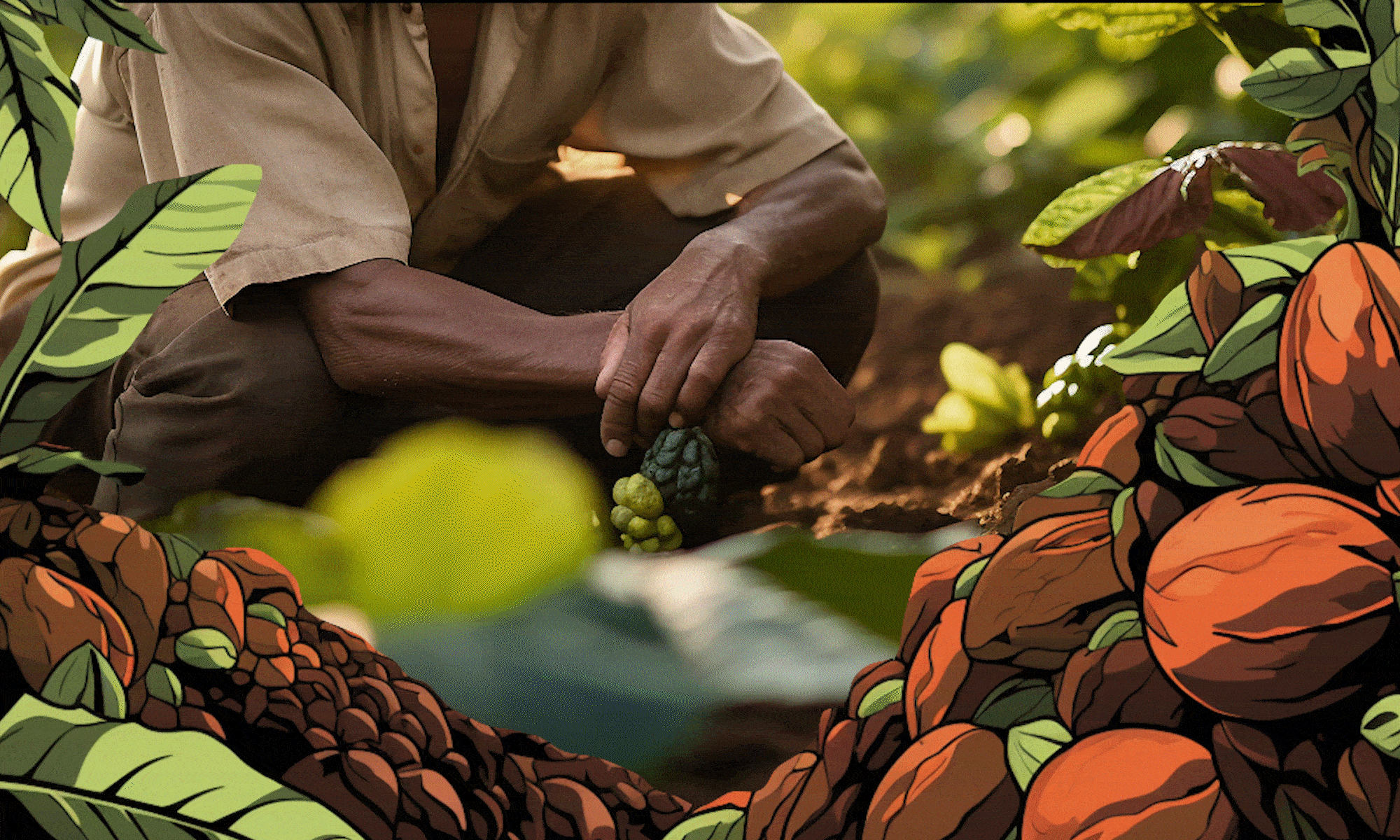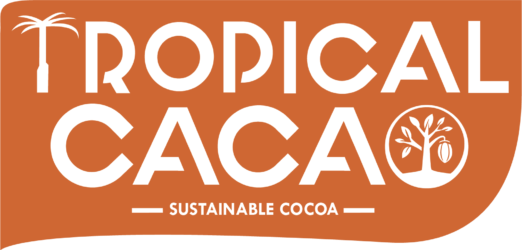Climate change is one of the greatest threats to global agriculture, and cacao production is no exception. The impacts of rising temperatures, unpredictable rainfall, and extreme weather events are becoming increasingly evident in cacao-growing regions. This article explores how climate change is affecting cacao production and the innovative solutions that can help mitigate these challenges to ensure a sustainable future for cacao farming.
The Impact of Climate Change on Cacao Production
Cacao is a delicate crop that requires specific environmental conditions to thrive. However, climate change is altering these conditions, leading to several significant challenges for cacao farmers worldwide:
- Rising Temperatures
Cacao trees thrive in tropical climates, typically between 20°C and 30°C. However, rising global temperatures are pushing cacao-growing regions into hotter conditions.
How It Affects Cacao: Increased temperatures can cause cacao trees to produce fewer beans, reduce the quality of the beans, and, in some cases, make growing cacao impossible in areas that were once ideal for cultivation.
Potential Consequences: This could lead to reduced yields and increased competition for land, as well as the displacement of cacao farming communities.
- Changing Rainfall Patterns
Cacao requires consistent rainfall throughout the year, with periods of both dry and wet seasons. However, climate change is causing rainfall patterns to become more erratic, with some regions experiencing droughts, while others face floods.
How It Affects Cacao: Inconsistent rainfall can lead to crop failures, especially if there is either too little or too much rain at critical points in the growing cycle. Too much rain can cause waterlogging, while droughts can hinder tree growth.
Potential Consequences: Farmers may face decreased productivity and an increased need for irrigation or drainage systems, which can raise costs.
- Increased Risk of Pests and Diseases
Warmer temperatures and humidity changes due to climate change create favorable conditions for pests and diseases that affect cacao trees. The cacao tree is susceptible to a range of pathogens, such as fungal infections and pests like the cacao pod borer.
How It Affects Cacao: Warmer climates accelerate the growth of pathogens and increase the likelihood of infestations, which can lead to crop loss.
Potential Consequences: Farmers will need to invest more in pest and disease management, which could increase costs and reduce yields.
- Soil Degradation and Erosion
Climate change impacts soil health by increasing the intensity of rainfall, which leads to soil erosion. This erosion can deplete the nutrients needed for healthy cacao growth.
How It Affects Cacao: Eroded soils lose their ability to retain nutrients and moisture, which directly affects the growth and quality of cacao trees.
Potential Consequences: Poor soil quality can lead to lower yields, and farmers may have to invest in costly soil regeneration or fertilization practices.
Innovative Solutions to Combat the Effects of Climate Change
Despite the significant challenges posed by climate change, there are several innovative solutions that can help cacao farmers adapt and mitigate the effects of a changing climate. Here are a few key strategies:
- Climate-Resilient Cacao Varieties
One of the most promising solutions to climate change is the development of cacao varieties that are resistant to higher temperatures, droughts, and pests.
What It Involves: Researchers are working on breeding cacao varieties that can withstand heat stress, water shortages, and disease outbreaks. These climate-resilient cacao trees have the potential to thrive in changing conditions and help farmers maintain consistent yields.
Benefits: These varieties can reduce farmers’ vulnerability to climate-related disruptions, ensuring a more stable cacao supply.
- Agroforestry: Combining Cacao with Other Crops
Agroforestry is a sustainable farming practice where cacao is grown alongside other crops or trees. This approach can help mitigate the effects of climate change on cacao production.
What It Involves: Agroforestry systems incorporate shade trees that protect cacao from excessive heat, improve soil fertility, and reduce the risk of erosion. Farmers can also grow complementary crops that diversify their income.
Benefits: Agroforestry systems create a more resilient farming environment, as they promote biodiversity, conserve water, and improve overall farm productivity.
- Water Conservation and Efficient Irrigation Systems
With changing rainfall patterns and water scarcity becoming a more significant issue, efficient water management is crucial for cacao production.
What It Involves: Farmers can implement rainwater harvesting systems, drip irrigation, and moisture sensors to optimize water use. Additionally, practicing soil conservation techniques, such as mulching, can help retain moisture in the soil.
Benefits: These methods help ensure that cacao trees receive sufficient water during dry spells, while reducing the impact of flooding during heavy rains.
- Improved Pest and Disease Management
As warmer temperatures foster the growth of pests and diseases, sustainable pest control methods become essential.
What It Involves: Farmers can use integrated pest management (IPM) strategies, which focus on preventing pest outbreaks through cultural practices, biological controls, and, when necessary, targeted pesticide use.
Benefits: IPM minimizes the use of harmful chemicals, protects biodiversity, and reduces the overall impact of pests and diseases on cacao crops.
- Farmer Education and Training
Education plays a critical role in equipping farmers with the knowledge and tools needed to adapt to climate change.
What It Involves: Training programs can teach farmers about climate change impacts, climate-resilient farming techniques, water management, and pest control strategies.
Benefits: Educating farmers empowers them to make informed decisions that enhance their resilience to climate change and improve the long-term sustainability of their cacao farms.
The Role of Chocolate Companies in Addressing Climate Change
Chocolate companies play a vital role in supporting cacao farmers as they face the challenges of climate change. By prioritizing sustainable sourcing and providing resources to farmers, companies can help drive positive change in the industry.
- Investing in Sustainable Farming Practices
Chocolate companies can fund research into climate-resilient cacao varieties and provide financial support for farmers to adopt sustainable farming practices, such as agroforestry and efficient irrigation systems.
- Promoting Fair Trade and Ethical Sourcing
By prioritizing Fair Trade certification and direct trade relationships with cacao farmers, chocolate companies can ensure that farmers are paid fairly for their efforts in adapting to climate change.
- Raising Consumer Awareness
Through their marketing and communications, chocolate companies can raise consumer awareness about the impacts of climate change on cacao production and the importance of supporting sustainable and climate-resilient products.
How Tropical Cacao Is Supporting Farmers in the Face of Climate Change
At Tropical Cacao, we are committed to supporting sustainable cacao production and helping farmers adapt to the challenges posed by climate change. Our initiatives include:
Researching Climate-Resilient Varieties: We work with agricultural experts to develop cacao varieties that can withstand extreme weather conditions and pests.
Promoting Agroforestry: We encourage farmers to integrate cacao with other crops to improve farm biodiversity, reduce soil erosion, and increase farm resilience.
Providing Training and Resources: We offer educational programs that help farmers implement climate-smart practices and adapt to changing conditions.
We believe that through innovation, collaboration, and sustainable practices, the cacao industry can thrive despite the challenges posed by climate change.
How You Can Help
As a consumer, you can support cacao farmers by choosing sustainably sourced chocolate products. Look for certifications like Fair Trade and Rainforest Alliance, which ensure that farmers are paid fairly and are encouraged to adopt environmentally friendly practices. By making informed purchasing choices, you can contribute to a more sustainable cacao industry and help mitigate the effects of climate change on cacao production.
Conclusion
Climate change presents significant challenges for cacao production, but through innovation and sustainable farming practices, cacao farmers can adapt and thrive. By supporting sustainable cacao farming, chocolate companies, and consumers alike can help ensure a resilient future for the cacao industry. At Tropical Cacao, we are committed to supporting cacao farmers and driving positive change in the industry to protect the future of cacao farming for generations to come.
Visit Tropical Cacao to learn more about how we are working to combat the effects of climate change on cacao production.

